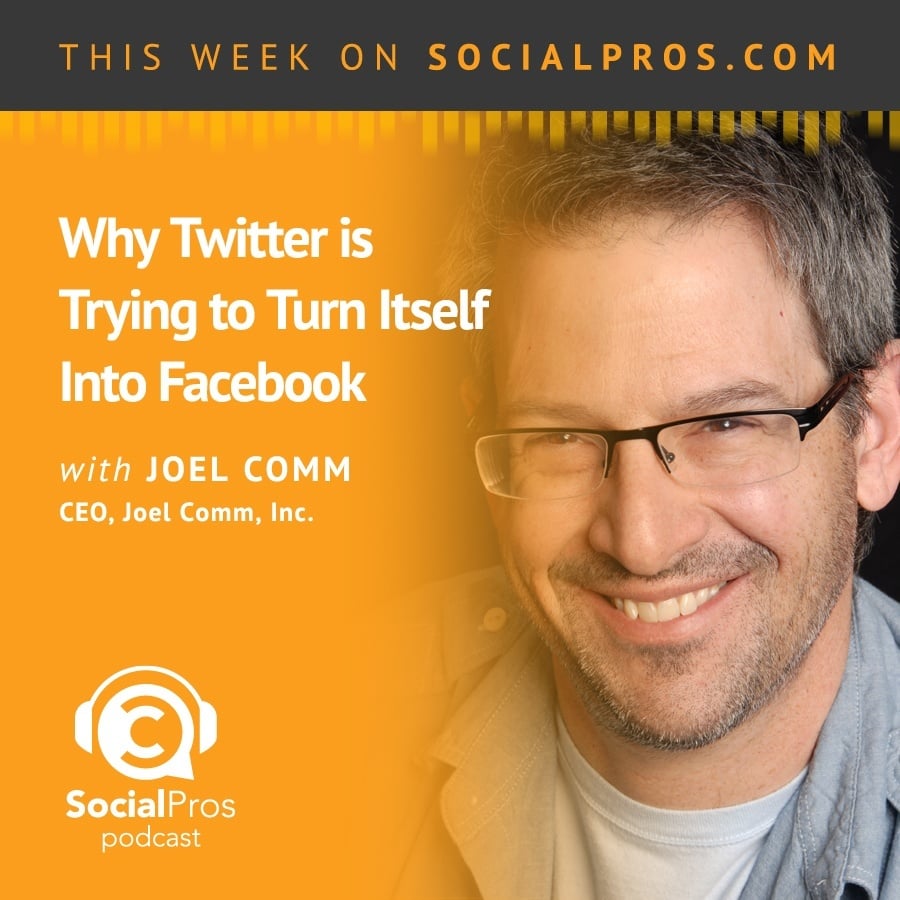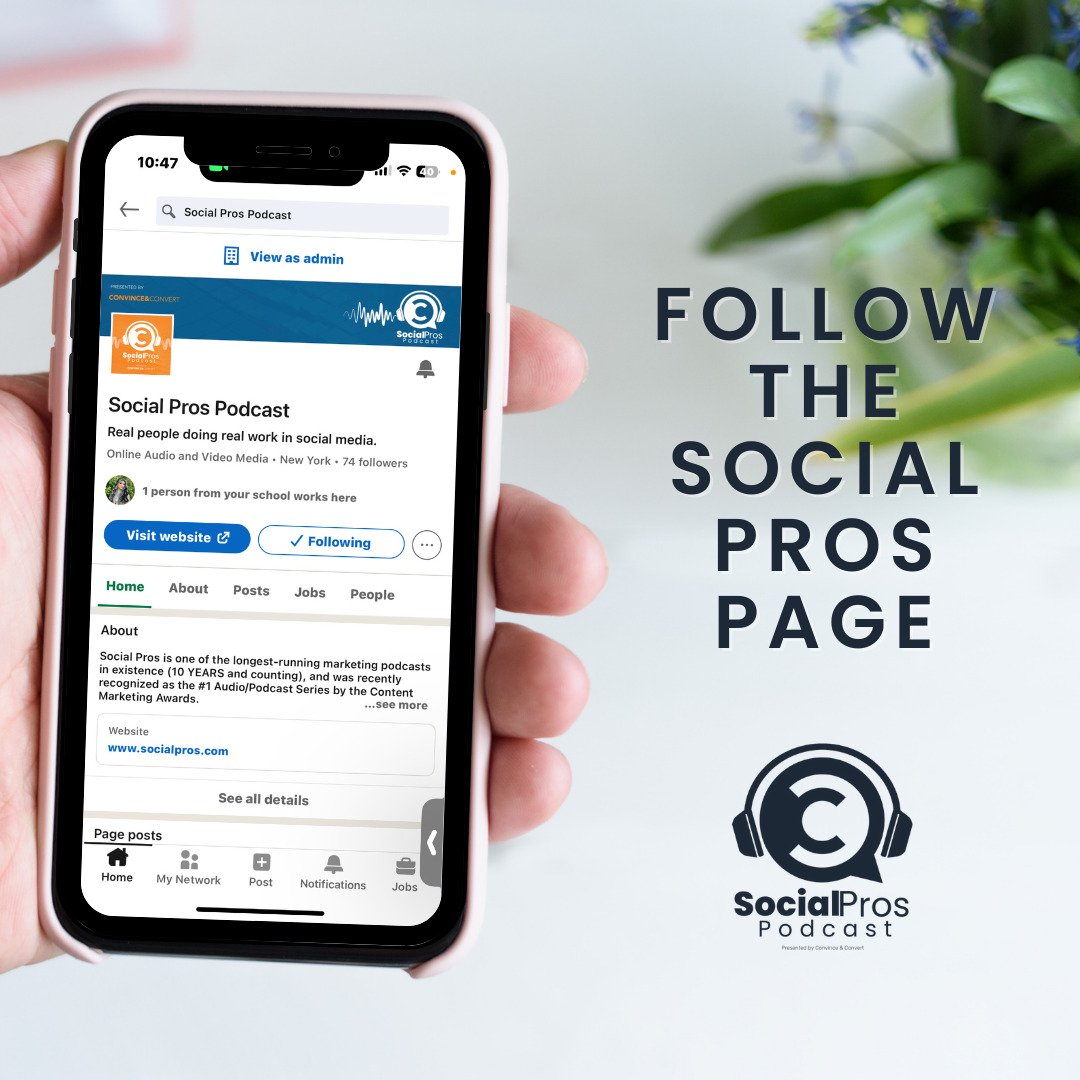Hosted By
About Social Pros Podcast:
Social Pros is one of the longest-running marketing podcasts in existence (10 YEARS and counting), and was recently recognized as the #1 Audio/Podcast Series by the Content Marketing Awards.
Our purpose? Making sure that we speak to real people doing real work in social media.
Listeners get inside stories and behind-the-scenes secrets about how teams at companies like Google, Reddit, Glossier, Zillow, Lyft, Marvel, and dozens more, staff, operate, and measure their social media programs. With 600+ episodes, the Social Pros Podcast brings the humanity of social media to the forefront, while providing incredibly useful marketing strategies that listeners can immediately implement.
Follow Social Pros on LinkedIn.
To inquire about becoming a guest or show sponsor, please email our Executive Producer, Leanna Pham, at leanna@convinceandconvert.com.
Apple Podcast Reviews:
The Social Pros podcast has quickly become a favorite in my feed! I'm consistently impressed by the engaging conversations, insightful content, and actionable ideas. I truly learn something every time I listen!
@Arlie KThis is absolutely an awesome listen for anyone in communications or social media!!
@Will31CThis podcast has become one of my staple weekly podcasts for learning about marketing! Love the conversations that they have and it's always enjoyable and educational!
@Simonstone95Love the podcast - informative, in depth and spot on for any business size.
@MissTriathlon
Joel Comm, co-author of “twitter power 3.0” and CEO of Joel Comm, Inc., joins the Social Pros Podcast this week to discuss Twitter’s move toward a Facebook user experience, its need for a higher character limit, and its future as a stand-alone service.
The Future of Twitter
Joel Comm is an author, speaker, entrepreneur, and consultant. He and Dave Taylor just co-wrote “twitter power 3.0,” the latest edition of his book first written in 2009. Joel has always been fascinated by computers and the internet, starting with his first TRS-80 Model 1 in 1980. In 1995, he started one of the first 18,000 websites in the world.
As such an early adopter, Joel learned very early on that social interaction online is fun, and you can meet some very smart, cool people. But he also found that yes, trolls existed online even 35 years ago, and it was never a good idea to discuss religion and politics.
Today, Joel discusses various aspects of Twitter, including changes that seem to be moving Twitter away from a unique user experience to more of a Facebook user experience. These changes are being driven by stakeholders who are seeing how many people sign up for Twitter and then don’t use it (not to mention the huge gap between the number of Facebook and Twitter users). They’re concerned with making the platform sticky. But, according to Joel, “Even though the numbers are very far apart, 284 million active users is nothing to sneeze at.”
Overall, Joel is pretty happy with Twitter’s new functionality. He’s excited about video streaming capabilities, because video is becoming the most enjoyed form of communication online.“Video is attention-grabbing for us,” he says. Even though Twitter owns Vine, it’s exciting to see its own native video platform coming to life, similar (again) to Facebook.
It will be interesting to see how YouTube fairs with this new competition.
Joel’s only major complaint with Twitter is the character limit. “There’s a frustration that you feel when you want to say more, but you can’t.” And the reason Twitter only allows 140 characters is not because it began with a revolutionary “micro-blog” concept. SMS was the original way to tweet, and the SMS limitation was 140. But nowadays, fewer and fewer users are using SMS to tweet, so why not increase the limit? They’ve already shown the capacity for it with the new Retweet function that allows an extra 116 characters to comment as you retweet. Add pictures (worth 1,000 words) and video into the mix, and really it seems like Twitter wants users to say more. Joel would like to see a little leeway, maybe even a small increase to 200 characters.
“I’m actually one of the ones beating the drum saying ‘Give us more characters.'”
It will be interesting to see what happens as Twitter moves forward, especially if stakeholders continue to feel it isn’t reaching important goals. If it doesn’t retain its value as a stand-alone service, Facebook or Google would be the obvious low-hanging fruit in terms of acquiring the popular network.
Joel would rather see it acquired by a major media company like Time Warner, HBO, Sony, or the like.
“I like to think a little more creatively, in that if we get to the point where we’re really talking acquisition, that it’s going to be a shift in the model of the site itself.”
See you next week!







